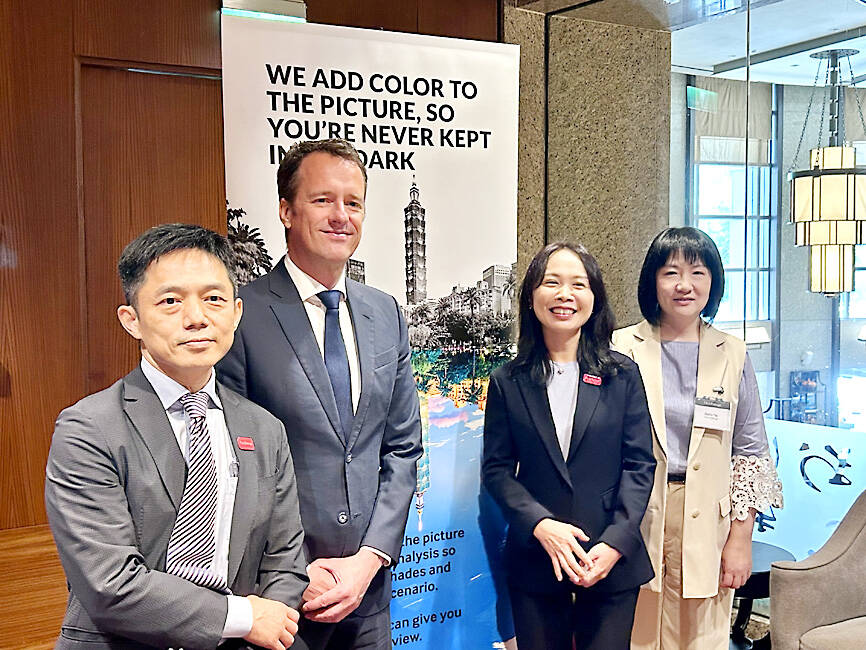A decline in premiums in the life insurance industry could moderate over the next 12 to 18 months, primarily due to a low comparison base, as local insurers adapt to regulatory tightening and economic uncertainty, Fitch Ratings said yesterday.
The premium retreat slowed to 11 percent in the first half of this year, compared with a 21 percent plunge last year due to a muddy global economic outlook and a shift away from unprofitable savings-type products amid stricter regulations, Fitch insurance analyst Stella Ng (吳傑佩) told a media briefing in Taipei.
Shares of investment-type products have been falling amid financial market volatility and regulatory restrictions in the past few years, noticeably with the prohibition of sales of new policies with negative contractual service margins, Ng said.

Photo: Wu Hsin-tien, Taipei Times
The changes led to a decline in the sales of savings products, including traditional annuity and interest variable life policies, she said.
However, Fitch said it sees an increase in health insurance policies, which might prove to be sustainable and more profitable growth drivers in the long term.
“We see health insurance expanding in line with an aging society, and rising awareness of health risks and healthcare needs,” Ng said.
Taiwan is on track to become a super-aged society in 2025 when people aged 65 or older would exceed 20 percent of its population, the National Development Council has said. Authorities have encouraged sales of protection insurance policies to help bolster the nation’s social safety net.
In the meantime, Fitch said it expects local insurers to face higher interest-rate charges under the Insurance Capital Standard framework that is to be implemented in 2026, in line with international accounting rule changes.
The new framework would set higher capital requirement on asset and interest-rate risks, it said.
The more stringent requirement could increase interest-rate-related capital charges to three to four times that of current levels, because the savings-type products local insurers sold in the past offer high guaranteed yields, Fitch said
New accounting rules would provide clarity on local insurers’ profitability outlook, as they would better reveal the movement of contractual service margins, it said.
The financial regulator is likely to clarify any localized adjustments and transitional measures for interest-rate risks, suitable for local business characteristics and conditions, in the near term, Fitch said.
Taiwanese insurers are running calculations under the current rules as well as the new framework, it said.
Fitch expects life insurers to continue raising capital through equity and subordinated debt.
Year to date, several major life insurers have issued or plan to issue subordinated debt of about NT$100 billion (US$3.13 billion).

Intel Corp chief executive officer Lip-Bu Tan (陳立武) is expected to meet with Taiwanese suppliers next month in conjunction with the opening of the Computex Taipei trade show, supply chain sources said on Monday. The visit, the first for Tan to Taiwan since assuming his new post last month, would be aimed at enhancing Intel’s ties with suppliers in Taiwan as he attempts to help turn around the struggling US chipmaker, the sources said. Tan is to hold a banquet to celebrate Intel’s 40-year presence in Taiwan before Computex opens on May 20 and invite dozens of Taiwanese suppliers to exchange views

Application-specific integrated circuit designer Faraday Technology Corp (智原) yesterday said that although revenue this quarter would decline 30 percent from last quarter, it retained its full-year forecast of revenue growth of 100 percent. The company attributed the quarterly drop to a slowdown in customers’ production of chips using Faraday’s advanced packaging technology. The company is still confident about its revenue growth this year, given its strong “design-win” — or the projects it won to help customers design their chips, Faraday president Steve Wang (王國雍) told an online earnings conference. “The design-win this year is better than we expected. We believe we will win

Chizuko Kimura has become the first female sushi chef in the world to win a Michelin star, fulfilling a promise she made to her dying husband to continue his legacy. The 54-year-old Japanese chef regained the Michelin star her late husband, Shunei Kimura, won three years ago for their Sushi Shunei restaurant in Paris. For Shunei Kimura, the star was a dream come true. However, the joy was short-lived. He died from cancer just three months later in June 2022. He was 65. The following year, the restaurant in the heart of Montmartre lost its star rating. Chizuko Kimura insisted that the new star is still down

While China’s leaders use their economic and political might to fight US President Donald Trump’s trade war “to the end,” its army of social media soldiers are embarking on a more humorous campaign online. Trump’s tariff blitz has seen Washington and Beijing impose eye-watering duties on imports from the other, fanning a standoff between the economic superpowers that has sparked global recession fears and sent markets into a tailspin. Trump says his policy is a response to years of being “ripped off” by other countries and aims to bring manufacturing to the US, forcing companies to employ US workers. However, China’s online warriors